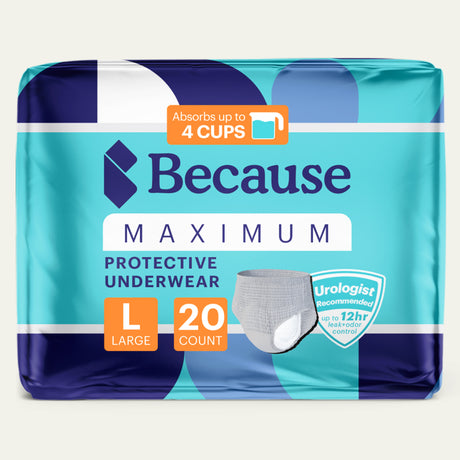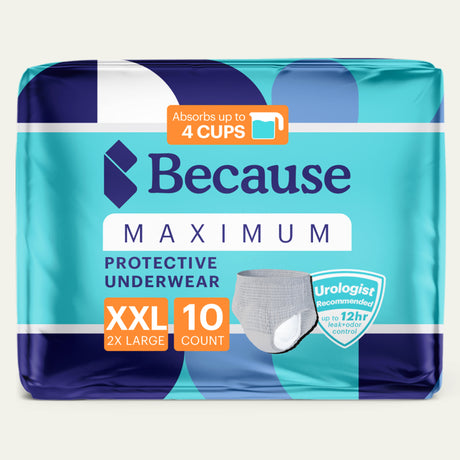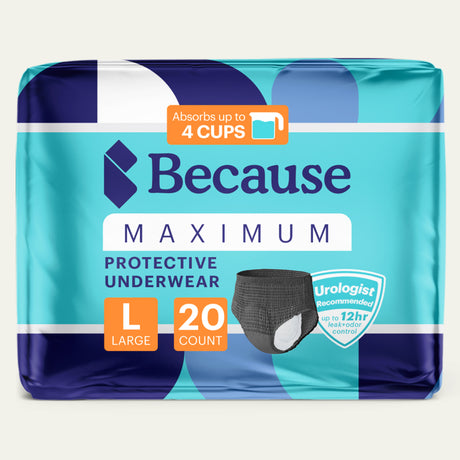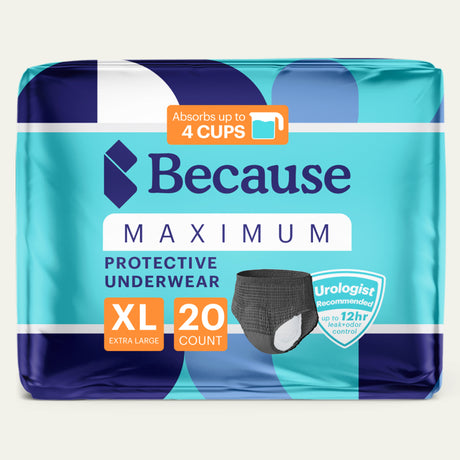Medically reviewed by Dr. Temitope Rude, MD
According to a 2020 survey by the National Social Life, Health, and Aging Project, about 75% of people aged 57 - 64 reported being sexually active. However, the rate of people who are sexually active does decline with age. Of the people aged 65 to 74, a little more than 50% reported being sexually active. While only 25% of adults aged 75 to 85 reported being sexually active.
These statistics lead to critical sexual health questions: Can adults over 50, 60, and 70 years old be sexually active? Do older women and men not have sex because they can't, or is something else at play? Does the rate of sexual activity vary among older women compared to older men? In this post, we'll explore the answers to these questions and discuss the benefits and challenges of sexual activity later in life.
Can a 70-Year-Old Man and Woman Be Sexually Active?
The good news is that older men and women can be sexually active. However, sex in old age may differ from when you were younger. Health problems and natural changes can make it more difficult for older couples to have an active sex life, but there are things you can do to maintain intimate relationships as you age.
Older men may struggle with issues such as erectile dysfunction, arthritis, and other health issues, but with the help of a physician these conditions can be managed and men over 70 can lead healthy sex lives.
Older women can also lead healthy sex lives after age 70. They may struggle with vaginal dryness, low libido, and arthritis as well but these conditions can also be managed with both OTC and prescription tools.
How Aging Affects Sex for Women and Men
Our bodies change as we age, and these age-related changes can lead to sexual problems in some people. Let's look at the mental, emotional, and physical changes affecting sexual functioning in older adults.
Vaginal Dryness in Women
Vaginal lubrication makes sex more comfortable for both partners. Although women continue to produce lubricant in their 60s, 70s, 80s, and beyond, hormonal changes during menopause cause the body to make less lubrication than it once did. As a result, many older women develop vaginal dryness. Health issues like diabetes and some autoimmune medical conditions can worsen the problem.
Postmenopausal women who experience vaginal dryness may find sex to be painful. Since the vaginal walls are dry, the tissue is more likely to develop rips and tears during sex, which could lead to bleeding.
Store-bought lubrication is one option, but doctors can also prescribe treatments for vaginal dryness. These treatments include hormone therapy with oral medications, estrogen creams, rings, suppositories, and tablets you insert into the vagina.
For more information about menopause and intimacy, check out this blog.
Erectile Dysfunction in Men
Erectile dysfunction, or ED, is when a man struggles to get or maintain an erection. It can occur at any age, but seniors are more likely to develop the problem than younger men. This type of sexual dysfunction can have a variety of causes, including:
- Diabetes, particularly if your blood sugar levels are not under control or you have nerve damage from the condition
- High blood pressure
- Atherosclerosis or hardening of the arteries
- Stress, including fears about sexual performance
- Some medications, including antidepressants, pain medications, and blood pressure medication
- Other health conditions like Parkinson’s disease or multiple sclerosis
- Surgery on the bladder or prostate
Fortunately, there are ways to deal with erectile dysfunction. Healthcare providers can prescribe medications like Viagra or Cialis that act on the blood vessels to increase blood circulation to the penis and improve erections. Men may also use penis pumps to encourage erections. Having fewer distractions in the bedroom and talking openly about the problem with your partner may also eliminate some of the anxiety and stress that can come with ED and lead to better sex.
Decreased Libido
Sexual desire may be experienced in the mind, but the hormones in our bodies help drive it. Testosterone levels in men and estrogen levels in women decline with age, and the reduction of these hormone levels can limit your sexual interest.
Not everyone experiences a loss of libido with age. In fact, some people find that no longer having to worry about pregnancy and having more free time in retirement increases their sexual desire. However, other older adults find it challenging to get aroused or discover that they don't think about sex as often. Although this is natural, it can pose a problem in romantic relationships if one partner lacks interest in sex and the other wants to maintain an active sex life.
Depression and Anxiety
Depression and anxiety don't just impact younger people. Many seniors also deal with these mental health conditions and other psychological changes that happen with aging, like declining cognitive function. Some risk factors for depression and anxiety in seniors include:
- Stress: Seniors may not have work stress in their lives anymore, but other stressors still exist, like chronic diseases, financial problems, relationship issues, family problems, and general concerns about the world.
- Grief: Mourning a wife or husband's death or the loss of friends and family members can lead to mental health problems.
- Genetics: Seniors with close relatives suffering from depression and anxiety may be more likely to develop it themselves.
- Social isolation: Loneliness is one of the biggest causes of depression among seniors.
- Sleep problems: Those with insomnia and other sleep conditions are at an increased risk for depression compared to those who get better sleep.
When symptoms of anxiety and depression can be linked to a specific stressor or event, they may resolve on their own—but for many people, they persist. Both depression and anxiety can rob you of your sexual desire. Plus, they can impact your overall health, potentially worsening sexual dysfunction and any chronic illness that may make it more difficult for you to be sexually active.
There are treatments for depression and anxiety, including prescription medications, stress management techniques, and talk therapy. Addressing mental health issues can benefit your overall health and your sexual well-being.

Benefits of Sex After 70
Despite all the changes that can get in the way of having sex after 70, there are benefits to continuing to be sexually active during your later years. Read on to learn how sex can contribute to good health.
Improved Cardiovascular Health
People who have uncontrolled or undiagnosed heart disease may not be able to safely have sex due to the strain that the activity puts on the heart. However, there is evidence that sex can promote heart health in older people who are healthy enough for the activity. One study found that men who have sex at least twice per week and women who report having satisfying sex regularly are less likely to experience a heart attack.
Pain Relief
When you experience an orgasm, your body releases feel-good chemicals called endorphins. They're the same natural chemicals that give athletes that famous runner's high while running a marathon. Not only do endorphins make you feel great, but they also act as natural pain relievers. As a result, sex may help ease discomfort associated with osteoarthritis and other medical conditions.
Boosted Immune System
Having sex once or twice a week may lead to a more robust immune system. Research shows that those who have sex regularly have higher levels of a substance called immunoglobulin A (IgA) in their saliva. IgA acts as an antibody and helps protect the body from viruses and bacteria.
Reduced Stress and Anxiety
Stress and anxiety may get in the way of sex, but those who maintain a healthy sex life may be able to lessen the effects of stress and anxiety on their bodies. One study found that cortisol levels in couples who identified themselves as grappling with high stress levels fell after sexual intimacy.
Cortisol is a hormone that the body releases in response to stress. When it remains elevated for long periods of time, it can cause anxiety and depression, headaches, digestive problems, sleep disturbances, weight gain, muscle and joint pain, and increase the risk of heart disease. By potentially lowering cortisol levels, sexual activity may help protect the body and mind from these negative effects of stress.
Improved Mood
Sex causes the body to release endorphins, and orgasms also flood the body with oxytocin, a sex hormone that brings on warm feelings of contentment. In other words, sex can provide an emotional pick-me-up. These findings are backed up by studies that show that couples who regularly engage in sexual intimacy are more likely to experience happiness.
Increased Self-Esteem
Feeling desirable to a romantic partner can give you a mental boost and improve your self-image. Older adults with active sex lives may feel more confident and have higher self-esteem as a result. Plus, sexual intimacy allows you to connect with others and may ease feelings of loneliness and isolation in seniors.

Overcoming Challenges of Sex After 70
In addition to physical changes, other things can interfere with sex when you're over 70. Here are some of the challenges you may face.
Chronic Pain
Sexual activity may ease pain, but people with chronic pain could find it hard to feel comfortable during sex. Osteoarthritis and other forms of arthritis are the leading cause of chronic pain in seniors. In addition to joint pain, this condition frequently causes stiffness that can further complicate sex.
Mobility Issues
Mobility issues are the leading cause of disability among older adults. People with difficulty walking, standing for long periods, or maintaining their balance may find it challenging to get into sexual positions and stay comfortable during intercourse.
Urinary Incontinence
For the 25 million Americans who suffer from urinary incontinence, sex can be more complicated. Intercourse puts pressure on the bladder and urethra, potentially causing urine leakage. In addition, urinary incontinence can lead to personal hygiene problems, and people with bladder control issues may feel inhibited due to worries about body odor.
If you’re looking to get back into the dating scene, but are worried about how to approach your incontinence in a romantic relationship, check out these 10 tips.
If you’re looking for tips to prevent bladder leaks after sex, check out this blog next and our recommended products below.
Social Stigma
Unfortunately, the media sends the message that older adults shouldn't have sex or aren't sexually desirable, and this attaches a certain stigma to sex among seniors. The truth is that sex is a natural part of life throughout adulthood, not something that older adults need to feel embarrassed or ashamed of.

7 Tips for A Healthy Sex Life After 70
Although sex may be different after 70 than when you were younger, you can still enjoy intimacy with your partner. These tips can help you lead a healthy sex life with age.
1. Redefine the Meaning of Intimacy
Being intimate does not always mean having traditional penetrative intercourse. Couples who find it difficult to have sex can still experience the joys of mutual pleasure in other ways.
Masturbating side by side, using sex toys, or engaging in oral sex may be good alternatives for those who find it difficult to have sex during their senior years. Sometimes, simple sexual contact is enough to deepen an emotional connection, even if neither person experiences an orgasm.
By redefining the meaning of physical intimacy and being open to trying new things, you can find ways to experience comfortable, safe, and satisfying intimacy for you and your partner.
2. Communication is Key
Talking openly about the challenges to sexual function as you get older is key to fostering an intimate relationship with your partner. When you're open about your own issues, your partner can feel free to do the same. Honesty and empathy can take the stress out of the experience and allow you both to relax and fully enjoy sex. If the unexpected happens, take it in stride, practicing patience with both yourself and your partner.
3. Use Lubrication
If you want to have penetrative intercourse, use a lubricant. There are two main kinds available: water-based and silicone-based. A water-based lubricant is lightweight and washes off easily with soap and water. However, the skin can quickly absorb water-based lubricants, so you may need to apply them more than once.
Silicone lubricants reduce friction more effectively. You can typically apply one just once before sexual activity, but it can leave your skin feeling greasy afterward.
Natural, oil based lubricants are also an option. These would be oils such as coconut oil or almond oil. These are a great option if your skin is easily irritated.
4. Try New Positions
Experimenting with new ways to position yourself during sex can make intimacy easier and more comfortable for both partners. Try:
- Spooning: The person who will be penetrating lies behind their partner, facing them, and enters from behind.
- Backs: Lie side by side on your backs. Then, have the partner getting penetrated sling their leg over the other person's, and select an entry angle.
- Chairs: With this position, the penetrating partner sits on a chair, and the other person gets on their lap facing them.
- Modified missionary: Couples who prefer to have the penetrating partner on top may still be able to achieve this position if that person bends their knees and puts their weight on their legs rather than on their partner.
Don't be afraid to use body pillows and cushions to support yourself during intercourse.
5. Practice Safe Sex
Pregnancy may no longer be a concern, but you can still contract sexually transmitted infections (STIs) from unprotected sex. Unless you're in a monogamous relationship and you've both been tested for STIs, wear condoms during penetrative intercourse and dental dams during oral sex.
6. Empty Your Bladder Before and After
If you have incontinence, using the bathroom immediately before intimacy may reduce the risk of bladder leaks. Women should urinate after sex to flush out their lower urinary tracts and help reduce the risk of urinary tract infections (UTIs).
7. Seek Medical Help for Sexual Function Issues
While the information discussed above is a good starting point for those hoping to have the best sex possible during their senior years, it's not meant as a substitute for individualized medical advice.
As an older adult, it's a good idea to talk to your healthcare provider about sex. Your medical provider can help you determine if it's safe for you to be sexually active and provide tips on how you can have a healthy sex life.
Your doctor can also discuss treatment options for sexual problems you may be facing and recommend lifestyle changes and other interventions for better managing chronic conditions that may be getting in the way of sex.
Many people feel uncomfortable or embarrassed talking about sex with their doctors, but you don't need to. Sexual health is part of physical health. Your healthcare provider will likely have an open mind and be ready to help you address the obstacles to senior sex so that you can enjoy more intimacy in your personal relationships.
Looking for incontinence products that can help you feel more confident? Try one of our sample packs!

Dr. Temitope O. Rude is a Clinical Assistant Professor at Stanford Urology. Dr. Rude received her B.A. in Neurobiology at Harvard University, and her MD from Stanford University. She completed her urology residency at New York University, followed by a fellowship in Female Pelvic Medicine and Reconstructive Surgery (FPMRS) at USC in 2020. Her research focuses on improving patient-reported outcomes post-surgery for pelvic organ prolapse, alongside groundbreaking work in the medical and surgical management of neurogenic bladder and complex voiding dysfunction.
Sources:
New York State Department of Health. (2015). Sexual health for older adults. Retrieved from https://www.health.ny.gov/diseases/aids/general/publications/docs/sexual_health_older_adults.pdf
Johns Hopkins Medicine. (n.d.). Is sex dangerous if you have heart disease? Retrieved from https://www.hopkinsmedicine.org/health/wellness-and-prevention/is-sex-dangerous-if-you-have-heart-disease
AARP. (2013). Don't let arthritis ruin your sex life. Retrieved from https://www.aarp.org/home-family/sex-intimacy/info-07-2013/dont-let-arthritis-ruin-your-sex-life.html
Cleveland Clinic. (2017). Benefits of sex. Retrieved from https://health.clevelandclinic.org/benefits-of-sex/
Ditzen, B., Hoppmann, C., & Klumb, P. (2019). Intimacy as related to cortisol reactivity and recovery in couples during everyday life. Psychosomatic Medicine, 81(1), 53-60. doi: 10.1097/PSY.0000000000000632
Mayo Clinic. (2022). Stress management. Retrieved from https://www.mayoclinic.org/healthy-lifestyle/stress-management/in-depth/stress/art-20046037
Galinsky, A. M., Leyva, K. J., Fitzsimons, G. M., & Kumashiro, M. (2019). Couples who have sex weekly are happiest. Society for Personality and Social Psychology. Retrieved from https://spsp.org/news-center/press-release/couples-who-have-sex-weekly-are-happiest
United States Census Bureau. (2014). Number, timing, and duration of marriages and divorces: 2009. Retrieved from https://www.census.gov/newsroom/archives/2014-pr/cb14-218.html

































